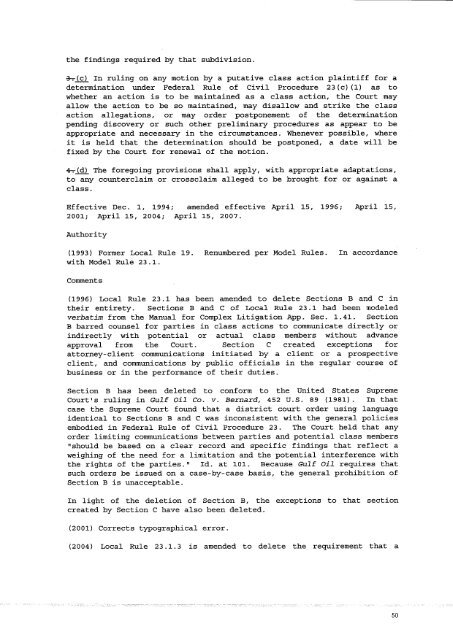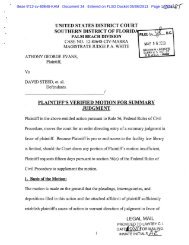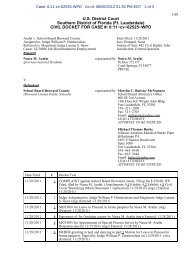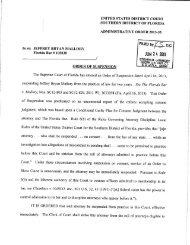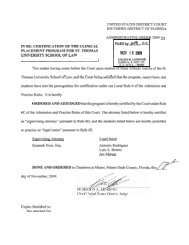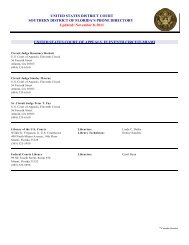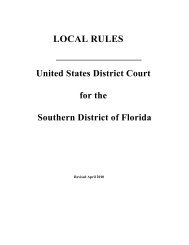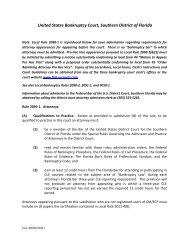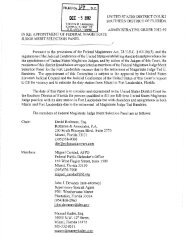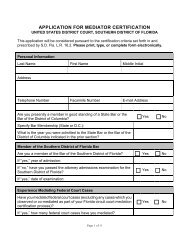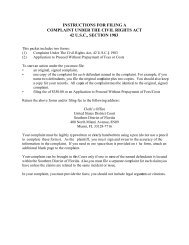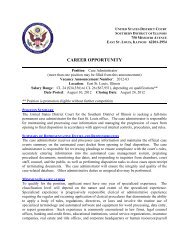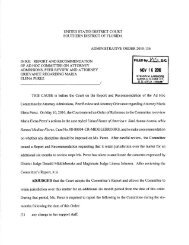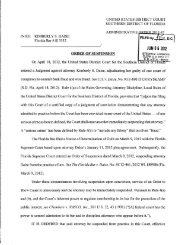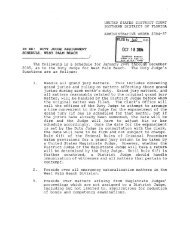JAN j 6 2010 - United States District Court
JAN j 6 2010 - United States District Court
JAN j 6 2010 - United States District Court
You also want an ePaper? Increase the reach of your titles
YUMPU automatically turns print PDFs into web optimized ePapers that Google loves.
the findings required by that subdivision.<br />
3-r-(c) In ruling on any motion by a putative class action plaintiff for a<br />
determination under Federal Rule of Civil Procedure 23(c)(l) as to<br />
whether an action is to be maintained as a class action, the <strong>Court</strong> may<br />
allow the action to be so maintained, may disallow and strike the class<br />
action allegations, or may order postponement of the determination<br />
pending discovery or such other preliminary procedures as appear to be<br />
appropriate and necessary in the circumstances. Whenever possible, where<br />
it is held that the determination should be postponed, a date will be<br />
fixed by the <strong>Court</strong> for renewal of the motion.<br />
4-r(d) The foregoing provisions shall apply, with appropriate adaptations,<br />
to any counterclaim or crossclaim alleged to be brought for or against a<br />
class.<br />
Effective Dec. 1, 1994; amended effective April 15, 1996; April 15,<br />
2001; April 15, 2004; April 15, 2007.<br />
Authority<br />
(1993) Former Local Rule 19. Renumbered per Model Rules. In accordance<br />
with Model Rule 23.1.<br />
Comments<br />
(1996) Local Rule 23.1 has been amended to delete Sections B and C in<br />
their entirety. Sections B and C of Local Rule 23.1 had been modeled<br />
verbatim from the Manual for Complex Litigation App. Sec. 1.41. Section<br />
B barred counsel for parties in class actions to communicate directly or<br />
indirectly with potential or actual class members without advance<br />
approval from the <strong>Court</strong>. Section C created exceptions for<br />
attorney-client communications initiated by a client or a prospective<br />
client, and communications by public officials in the regular course of<br />
business or in the performance of their duties.<br />
Section B has been deleted to conform to the <strong>United</strong> <strong>States</strong> Supreme<br />
<strong>Court</strong>'s ruling in Gulf Oil Co. v. Bernard, 452 U.S. 89 (1981) . In that<br />
case the Supreme <strong>Court</strong> found that a district court order using language<br />
identical to Sections B and C was inconsistent with the general policies<br />
embodied in Federal Rule of Civil Procedure 23. The <strong>Court</strong> held that any<br />
order limiting communications between parties and potential class members<br />
"should be based on a clear record and specific findings that reflect a<br />
weighing of the need for a limitation and the potential interference with<br />
the rights of the parties." Id. at 101. Because Gulf Oil requires that<br />
such orders be issued on a case-by-case basis, the general prohibition of<br />
Section B is unacceptable.<br />
In light of the deletion of Section B, the exceptions to that section<br />
created by Section C have also been deleted.<br />
(2001) Corrects typographical error.<br />
(2004) Local Rule 23.1.3 is amended to delete the requirement that a<br />
50


